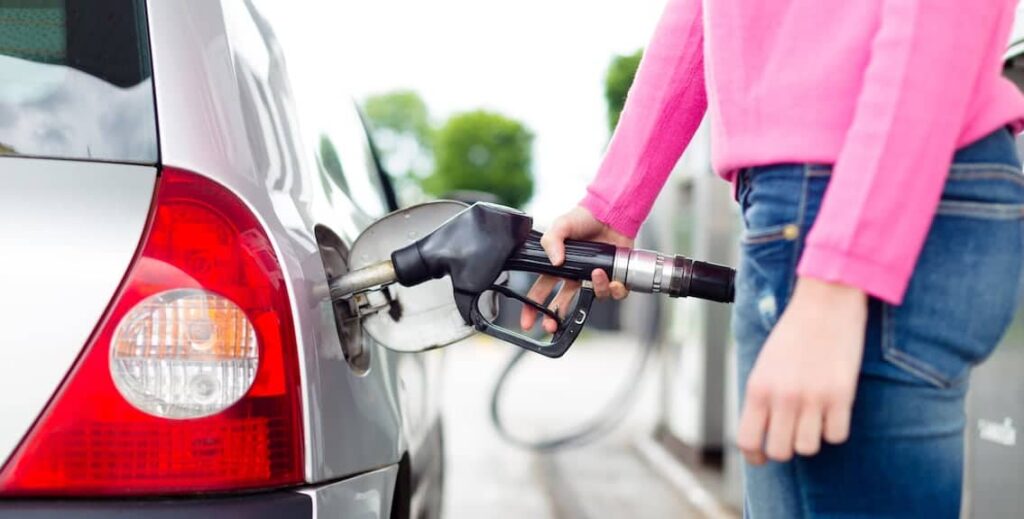Whether you drive an off-roading specialist such as the Wrangler, the Gladiator pickup, or a more family-oriented Grand Cherokee, it’s important to remember to always use the right type of fuel. Gas comes in various forms, including regular unleaded, premium, and midrange. Some vehicles also run on diesel or different gas blends to reduce emissions. Here at Huffines Chrysler Jeep Dodge Ram (CJDR) Plano, our Jeep experts have put together some tips for you on what gas to use in your Jeep. We’re happy to give you further advice if you don’t find the answer to your question here.
What Type of Gas Should You Use for a Wrangler?
Your decision will depend on the type of engine your Wrangler has and whether you’re driving a new or used model. Older Wranglers tend to have a 3.6L V-6 engine that runs best on regular unleaded gas, also known as 87-octane gas. You can use higher-grade gas if you like, but Jeep doesn’t require this.
If you own one of the new Wranglers with the 2.0L turbocharged engine, things are a bit different. These Wranglers require premium gas. This type of fuel is also sometimes referred to as 90-octane gas. Premium gas is typically used in high-performance vehicles, such as sports cars and those with turbocharged engines.
If you’re unsure about which type of gas to use, it’s best to consult your owners manual, where you’ll find the manufacturer’s recommendation. Alternatively, one of our Jeep experts can advise you on the gas required by your specific Wrangler model. You can schedule an appointment at our service center using our online form if you’re having problems with your vehicle’s fuel or your engine is causing you trouble.
Do Jeeps Require Premium Fuel?
Some Jeeps require premium gas, especially those with a turbocharged engine. As we’ve already noted, that’s the case with Wranglers that have a 2.0L four-cylinder engine. Many other Jeep vehicles have an optional engine in their lineup that requires premium gas.
For instance, the Grand Cherokee SUV has a V-6 base engine that can run on regular gas. However, there’s a plug-in hybrid version of this SUV that’s powered by a turbocharged four-cylinder engine and an electric motor. If you have this set up in your Grand Cherokee, the turbocharged engine will require premium gas.
You can rely on regular unleaded if you’ve confirmed your Jeep doesn’t need premium gas. You can also use midrange or premium gas if that’s your only option. There are some different gas blends found particularly in states with strict vehicle emissions rules, such as California and New York. These gas options include traditional gasoline mixed with other products, such as ethanol. If your Jeep’s fuel cap has “FFV” marked on it, this means your Jeep is fuel flexible and can cope with these different gas types.
As the example of the Grand Cherokee shows, Jeep is starting to bring plug-in hybrid options to its vehicle lineup. These vehicles typically have a gas-powered engine, an electric motor, and a battery pack. You’ll need to regularly charge your battery using a public charging station or a connection at home to get the most out of these models.
Are There Jeep Models That Use Diesel?
Diesel engines are less common in the U.S. than gas-powered units, but they’re growing in popularity. They’re more efficient than their gas-powered counterparts and can be longer lasting. Your Jeep will only use diesel if your crossover or truck has a diesel engine. This may apply to you if you drive a Jeep Gladiator. The Gladiator has two engine options in its latest design, including a 3.0L turbodiesel that puts out 260 horsepower and 442 lb-ft of torque. If you buy a Gladiator with this engine option, it will require diesel to run.
The Gladiator’s fuel economy numbers show the significant improvement in efficiency produced by diesel engines. With its standard gas-powered engine, the Gladiator achieves 16 mpg on city roads and 23 mpg at highway speeds, which are still decent numbers for a midsized pickup. However, the 3.0L turbodiesel boosts fuel economy to 22 mpg and 28 mpg, respectively. Diesel engines are also very effective when it comes to towing heavy loads.
Why Using the Right Fuel Is Important
Following the manufacturer’s fuel recommendation is important because it can prevent damage to your engine’s components or reduced performance. If you put regular gas in a Jeep with a turbocharged engine that requires premium gas, you may experience reduced power and fuel economy. If you make this mistake over a long period, it could also cause more wear and tear or other types of damage to your engine.
Another potential problem is known as engine knock. This occurs when gasoline ignites prematurely in the combustion chamber, causing a knocking or pinging sound. Turbocharged engines can be more prone to knock, which is one reason they need premium fuel. The higher octane level in premium fuel reduces the likelihood of pre-ignition.
If your vehicle has an engine that runs on regular gas, the consequences of choosing the wrong fuel are less significant. A Wrangler or Cherokee with a V-6 will have no trouble running on midgrade or premium fuel. The only difference you’ll notice is that you’ll pay more at the pump since the higher-octane fuel grades cost more money. On the other hand, diesel engines can suffer significant damage if you make the mistake of putting regular gas into the fuel tank.
If you’d like further advice about which gas to put in your Wrangler or Cherokee, we’re here to help. At Huffines CJDR Plano, our Jeep-certified service technicians know Jeep’s lineup well and can provide you with expert tips. You can explore the full range of new and used Jeep crossovers and trucks in our Plano showroom and take advantage of excellent auto financing options at our finance center. If you’re considering purchasing a new Jeep, why not try it out first by arranging a test drive near Dallas?





